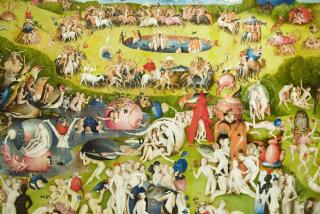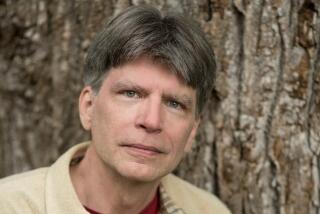NOT OF THIS EARTH : Orange County Apple and Other Aberrations
For a vision of an unpolluted, pristine Orange County, science-fiction fans will enjoy Kim Stanley Robinson’s utopian novel, Pacific Edge (Tor/St. Martin’s: $18.95; 326 pp.). Late in the 21st Century, a peaceful revolution has replaced strong central government and harmful technology with local autonomy and simple, preindustrial life styles in restored natural environments. Science marches on, with solar power satellites, manned expeditions to Mars and room-temperature superconductors, but its ugly byproducts have been all but eliminated in Robinson’s El Modena, a town where bicycles are the primary means of transportation.
Since Robinson redefines utopia as a society moving towards perfection--not a perfect society--he can make “Pacific Edge” a real story, not a symposium. El Modena residents enjoy idyllic days of soul-satisfying manual labor, softball and nature hikes, but they also have genuine problems to confront. Local politicians have been corrupted by an evil consortium planning to build an industrial park on an unspoiled mountain, and Robinson’s hero is caught in a wrenching romantic triangle.
While Robinson’s characters are well drawn, they also are a bit unbelievable in the way they combine their advanced knowledge with their simple existence. Residents have access to a global telecommunications network, for instance, but they remain obsessively concerned with local issues. In essence, Robinson says that we can eat from the Tree of Knowledge and still live in the Garden of Eden--but can we?
Having received numerous awards and widespread acclaim, Orson Scott Card should be considered a major science-fiction writer, and he is an appropriate subject for a large, retrospective anthology like Maps in a Mirror: The Short Fiction of Orson Scott Card (Tor: $22.95; 675 pp.). Several of these stories confirm Card’s reputation as a masterful storyteller. Told with skill and conviction, “Holly” follows an anthropologist, studying primitive aliens, who must participate in their religious ritual by carrying part of a tribesman’s body to the top of a sacred mountain.
In “The Originist,” Card contributes a chapter to Isaac Asimov’s “Foundation” series. He recounts how scholars in the capital of the galactic empire secretly establish a “Second Foundation” to investigate human problems and prepare for the rebirth of civilization. In the story, Card displays an economy of style, sense of excitement and eye for detail that compare favorably with Asimov himself.
Despite these and other fine efforts, however, “Maps in a Mirror” also reveals troubling trends in Card’s fiction. Too many stories settle for a comforting vision of cosmic justice rewarding virtue and punishing evil, for instance, when Card is capable of probing more deeply into the issues he raises.
In 1941, Isaac Asimov published the acclaimed story Nightfall (Doubleday: $19.95; 384 pp.), about a world called Kardash with six suns where darkness falls only once every 2,500 years. People gather to observe the coming of night, knowing it will bring madness, destructive fires and the end of civilization.
Now Asimov and Robert Silverberg have elaborated on the original story, adding new characters and incidents mostly involving implausible coincidences or implausibly stupid characters. They add long explanations of the Kardashian aversion to darkness and how it causes insanity. They add blatant padding; characters even lambaste each other for repeating themselves. But since they add no new ideas, Nightfall is still a short story.
John W. Campbell Jr., the man to whom the book is dedicated, defined science fiction as “mental research into possible futures.” In particular, a science-fiction novel needs more than One Big Idea and that idea must be carefully examined and developed in the context of an appropriately alien environment. In other novels, Asimov and Silverberg each has produced such fully realized futures. Here, they don’t even try.
Instead, their extraordinary introduction implies that science fiction is mainly a matter of concocting funny-sounding words for familiar objects, so they have dispensed with those silly distractions. Their novel asserts that Kardash, except for constant daylight, is just like Earth, right down to its tenure-seeking professor, pleasant suburban homes and freeway commuters in rush-hour traffic. This picture, acceptable as a short premise, collapses when examined at length: A world like Kardash, in perpetual light, couldn’t possibly be just like Earth. If Asimov and Silverberg really thought through the implications of a world without darkness, they could write a fascinating and worthwhile novel. “Nightfall” is not that novel.
Taxonomies proclaim that “Science fiction is a branch of fantasy,” but modern fantasy became a publishing category as a branch of science fiction, a refuge for those who did not want their imaginations fettered by the laws of science. The possible rewards of this approach are evident in Charles de Lint’s The Little Country (Morrow: $22.95; 544 pp.).
His main story involves a magical book, also called “The Little Country,” which tells a different story to each person who reads it. A Cornwall family struggles to keep the book away from a sinister cabal seeking to exploit its powers. Alternating chapters present the story which the heroine reads in the book, a fantasy about a girl turned into a pixie by an embittered witch. The tales are effectively intertwined, with subtle and evocative parallels.
In a genre choking to death on regurgitated Tolkien, De Lint does research and imbues his story with an unusual, authentic atmosphere. In a genre of elaborately mapped Neverlands, De Lint sets his tale in our contemporary world and makes it no less magical. And in a genre plagued by automatons acting out Joseph Campbell’s theories, De Lint develops complex characters and original plots.
Still, it’s hard to swallow De Lint’s message, presented by two characters awkwardly introduced as mouthpieces. Our scientific world has driven away the world of fairies, and to become whole again, we must relearn the ancient music which defines humanity. Even in the context of a charming fantasy, it is a bit wistful to hope that modern problems can be solved by reviving the folk wisdom of magic and pixies.
Perhaps, though, the function of fantasy is to rediscover old truths, to remind us of where we have been. The task of science fiction, then, is to invent new truths, to indicate where we might be going. De Lint demonstrates the success of fantasy; our other authors show that success in science fiction is harder to achieve.
More to Read
Sign up for our Book Club newsletter
Get the latest news, events and more from the Los Angeles Times Book Club, and help us get L.A. reading and talking.
You may occasionally receive promotional content from the Los Angeles Times.






